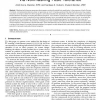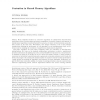20 search results - page 4 / 4 » Transparent Concurrent Execution of Mutually Exclusive Alter... |
PPOPP
1997
ACM
13 years 11 months ago
1997
ACM
As shared-memory multiprocessors become the dominant commodity source of computation, parallelizing compilers must support mainstream computations that manipulate irregular, point...
TSE
1998
13 years 7 months ago
1998
—Masking fault-tolerance guarantees that programs continually satisfy their specification in the presence of faults. By way of contrast, nonmasking fault-tolerance does not guara...
STOC
1993
ACM
13 years 11 months ago
1993
ACM
Most complexity measures for concurrent algorithms for asynchronous shared-memory architectures focus on process steps and memory consumption. In practice, however, performance of ...
SPW
2004
Springer
14 years 24 days ago
2004
Springer
How can we design a PDA that is at the same time secure and usable? In current implementations the two properties are mutually exclusive. Because normal users find password entry ...
MICRO
2010
IEEE
13 years 5 months ago
2010
IEEE
Abstract--Many shared-memory parallel systems use lockbased synchronization mechanisms to provide mutual exclusion or reader-writer access to memory locations. Software locks are i...


